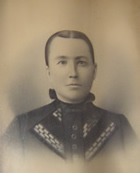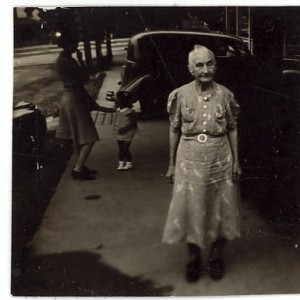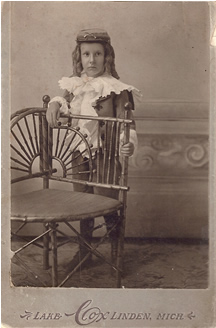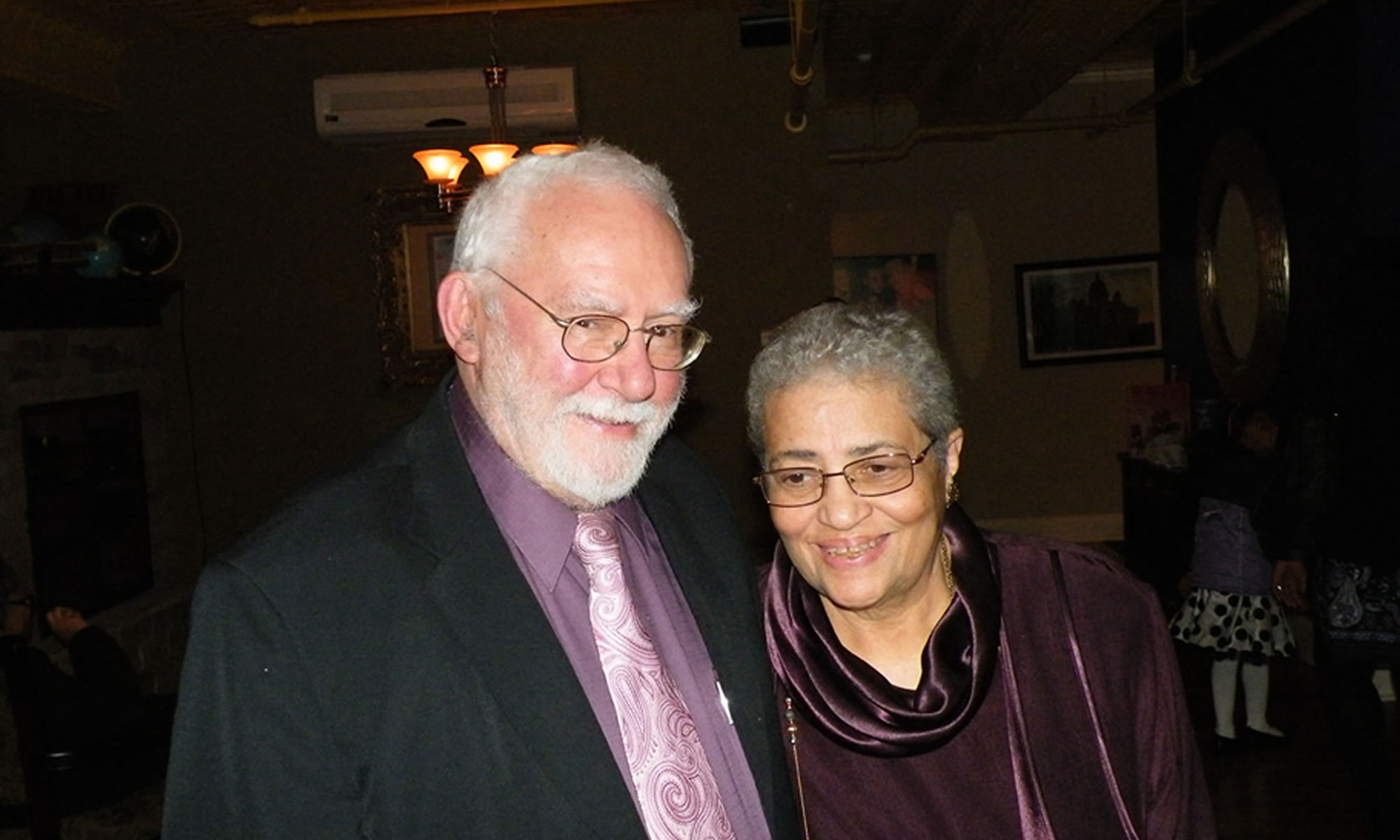Life in Hancock
Since I was the youngest child in the Brulé household, I held a very special position. In particular, Warren, who is 17 months older than me, was responsible for my well being when we were out of the house. This did not necessarily sit well with him – but he did a great job of baby sitting his little brother.
As I remember my dad he was a baker operating his own shop, and worked long hours. This was not his first choice for a way to make a living, but as I understand it he was forced into it. My dad was born and raised in Lake Linden, a village about 12 miles east of Hancock. He went to a parochial school there, where the teaching was all in French and thus he became fluent in Parisian French. At the time he met my mother he was working as an engineer on a train serving one of the local copper mills. My mother was a teacher in the small settlement named Paradise, and dearly loved this life of teaching and single blessedness. They met in her sister’s boarding house, and were married. That must have been around 1919. Apparently the first year of their marriage they lived with my dad’s mother, and this almost resulted in their breakup.
 This is a picture of Grandma Brulé. My mother left Lake Linden alone and took a teaching job in Hurontown, a little village near Houghton. She informed my dad that he could live either with his mother in Lake Linden or with her in Hurontown. Fortunately, he chose the latter.
This is a picture of Grandma Brulé. My mother left Lake Linden alone and took a teaching job in Hurontown, a little village near Houghton. She informed my dad that he could live either with his mother in Lake Linden or with her in Hurontown. Fortunately, he chose the latter.
Janet was born on August 20, 1922, Warren on September 30, 1925, and I was born on March 13, 1927. This was during good economic times and my father and his brother-in-law Napoleon Brodeur started up a bakery business. But then the depression hit and Uncle Nap pulled out of the business. My dad struggled hard to make ends meet, as I found out later. For example, around 1945 he showed me a saffron storage container. He said, “John D., today I finally paid off the last installment on the saffron.” Apparently he had bought the saffron in the mid 30’s for about $25 and had been slowly paying for it. It took a decade for him to achieve the goal of eliminating that debt.
But my dad wasn’t all work, although he put in long hours in the bakery. One spring he decided that he would build a small boat. Uncle Nap’s insurance business office was right near our house – most everything in Hancock was right near everything else, and he let dad use a spare room to do the work. He decided to build a 12 foot rowboat. He used marine plywood for the sides, and covered the sides with canvas. He worked at this for many weeks, and finally when it was done he borrowed a 5 horsepower outboard engine and off we went to check it out. We drove out to Lake Superior, near the small town of Gay, on the Keeweenaw peninsula. We launched the boat, my dad and we three children got in it and he started the engine. It was lots of fun, and we each had a chance to steer it.
A little way off the shore, perhaps about ½ mile, there was an island. We thought it would be great to go to it and check it out. So we did, and naturally without any thought about such things as life jackets. We explored the island for a while, and then decided to head back. My dad encountered serious trouble in trying to start the outboard motor, and then to keep it running. It would start up, after several pulls on the lanyard, but then stall out. He finally decided that we had to start back as it was getting late. (The trouble was that he failed to open an air vent on the gas tank, and thus the engine was starved for fuel.) Of course Lake Superior is at best unpredictable, and shortly after we started back a breeze sprung up. And there we were on a small boat whose engine would stall every minute or so. Well, it doesn’t take much of a breeze to develop some waves that are dangerous for a 12-foot rowboat filled with 4 people. We had a bailing can in the boat, since this was our first time out and dad wasn’t sure how much it would leak. We made good use of the can as my dad kept restarting the motor; the boat was bobbing and rolling severely in the waves. Obviously we did make it back and the only problems were that my dad was exhausted from restarting the motor, we were all frightened, and we all got drenched.
My dad seemed to me to be a very pleasant and friendly person. Of course I didn’t see him much, but he seemed to like to talk with friends and he was always very quiet. The only time I saw him get angry was when I was helping out in the bakery. We three children had to pitch in since there always seemed to be a lot of work to do. I cleaned pans mostly. Whatever Dad baked always resulted in some material left in the baking sheets and pans. We would have to scrape the pans with a special knife and then give them a light coating of grease. This was an after school sort of job, which wasn’t a great deal of fun.
The bakery had a large bench in the work room – large enough for 4 people or so to be working at it. I think I must have usually complained a lot about having to work there, because even the other help in the bakery got tired of my attitude. One time I started to moan, but then turned it into a song. The people on the bench cheered at my finally joining the team.
I didn’t do much actual baking, but Dad would buy eggs by the crate. He had built a freezer in the work room and I had the job to break and separate the eggs as that is the way he stored them. However, he did teach me how to make pastys – a sort of meat pie in a shell. The pasty had its origin in Cornwall, England. After I got married Sally and I lived in Hancock for two years, and we tried to eke out a living on the $100 per month that I got on the GI Bill. Since that was impossible I started to make pastys in the bakery. I paid my Dad a portion of the sale price of each pasty, and this turned out to be a great source of income. So, every once in a while I make pastys again, and that feels good. I first made them in Syracuse with Dick and Verah Johnson and this always turned into a great baking, drinking, and feasting session. I showed Mark how to make them, and he soon outclassed me in the quality of the work.
Another job I did around the bakery was to deliver orders to the stores – usually on Saturdays. This is truly where I learned how to drive in the winter as Hancock is built on the side of a hill and the snow there is enormous.
My mom didn’t go in for camping and exploring and such. She had a small circle of friends and preferred to talk with them rather than to go off into the woods. My mother had given up her teaching career to be a stay-at-home mom, but whenever she was asked to fill in she was thrilled to be a substitute teacher. As you can see from the map, the backyard of our house was nearly adjacent to the Suomi College. So my folks opened up our home to a College student who was looking for room and board, and the student became a ‘mother’s’ helper. This was in the 30’s during the height of the depression and everyone was looking for help. My mother would also take in roomers during this time, so we all crowded up some more in our rooms.
One night the doorbell rang and when my dad answered it he found a family of three that were driving a car with a Canadian license and looking for a room for the night. They were from Quebec City, and were conversing in French. According to my dad, the wife indicated to her husband how exhausted she was and she hoped we had a room for them. Well, before there could be any translation my dad greeted them in French and assured them that indeed we had a room all prepared. They certainly were pleased to hear that!
Just about every weekend, except during the winter, we would go for a ride in the car. We rarely would go to Lake Linden, where my grandmother Brulé lived. The visits there didn’t last very long. The conversation was all in French, since grandmother didn’t speak any English. At best this was a most boring visit for she lived in a small house and there was little or nothing for us children to do.
On these Sunday rides we would more often go to Paradise, the small settlement above Chassell and about 7 miles from Hancock. My mother’s maiden name was Poisson, which her dad had anglicized to Fish. Her father’s name was John D., and that’s where my name came from. I have never really believed what the D stands for. After pressuring my mother on the issue she said my middle name is Dosithé, but I think she made it up on the spot. Anyway she had no idea what the name meant. Grandpa and Grandma Fish also spoke almost no English, but at least they lived on a farm, so we had more exploring we could do.
 This is a picture of Grandma Fish taken late in her life. Grandfather John D. had a horse named Jerry, and at times would hitch him up to a buggy to ride in to Chassell. I remember sitting with him on a swing in the barn. He had a fly swatter, of course, and used it on the local fauna. He was a tall and stately man, but of course there was very little conversation between us. My grandmother Fish was a very short woman, and ruled the roost. I don’t know what she would say to him, but when she spoke, he acted. He was one of the few people in the Chassell/Paradise region that had been to school. I believe he had a fourth grade education, and since he could read he became the Postmaster. But this was long before I was born, and I merely remember him sitting on his swing and swatting flies.
This is a picture of Grandma Fish taken late in her life. Grandfather John D. had a horse named Jerry, and at times would hitch him up to a buggy to ride in to Chassell. I remember sitting with him on a swing in the barn. He had a fly swatter, of course, and used it on the local fauna. He was a tall and stately man, but of course there was very little conversation between us. My grandmother Fish was a very short woman, and ruled the roost. I don’t know what she would say to him, but when she spoke, he acted. He was one of the few people in the Chassell/Paradise region that had been to school. I believe he had a fourth grade education, and since he could read he became the Postmaster. But this was long before I was born, and I merely remember him sitting on his swing and swatting flies.
Across the road from my Grandparents Fish was another farm, this one belonging to the LaTendresse family, Minnie and Eugene. Minnie and my mother were first cousins, and Minnie again was a very small person. Her husband Eugene was tall and soft-spoken. She spoke enough English so that we could converse, but Eugene was illiterate in English, as I was in French. The children of Minnie and Eugene included Cyril, Walter, Loraine and others I did not know very well. When I was quite young my mother had to go to the hospital in Ann Arbor, Michigan, as she was sick with Bell’s disease. She was there for several weeks, and we three children were parceled out to various relatives. I was too young to remember, but I was with Cousin Minnie for that interval. Cyril, who was about 10 years older than me, was basically my baby sitter. In ensuing years I spent some time in the summer on their farm. I remember riding on the hay wagon as Cyril and others drove the horses up and down the fields first cutting and then baling the hay.
The Latendresse’s had a business, called Twin Elms Dairy, selling milk. It was not pasteurized, but each day Cyril would deliver milk along his route in Chassell. I would ride with him and help a little bit. They had a herd of about 30 cows, so I got to help turn out the cows to the fields after milking, as well as herding them to the barn in the morning and helping with the milking. I never was very good at it, but I think I did reduce their workload a trifle. Every couple of weeks Cyril drove his team of horses to a local brewery in Houghton to fill his wagon with malt. He augmented the cows feed with this to increase their milk output. So, I got to know Cyril quite well, and always thought of him as a grownup man, not a teenager. Over the years I saw Cyril only rarely, although in the last several years my contacts increased. I love to drive up to Paradise whenever I visit the Upper Peninsula, and I always stop in to see him, and his wife Florence. He wrote a booklet of his memories, and it makes fascinating reading. He had a world of experiences in his life, and was less than a gentle person. This latter characteristic came as a surprise to me because I only remembered him as my guardian. But he sure ruffled feathers during his lifetime. A couple of years ago he died, but Florence still lives in the LaTendresse house.
 This is my dad when he was about 7 years old. He was to get his first “short” haircut. He was the darling of his sisters and he wanted this picture to include his dog. However the dog jumped away at the last minute. His hair was strawberry blonde and I remember we had a lock of it in a drawer of a library table. The lock seems to have disappeared.
This is my dad when he was about 7 years old. He was to get his first “short” haircut. He was the darling of his sisters and he wanted this picture to include his dog. However the dog jumped away at the last minute. His hair was strawberry blonde and I remember we had a lock of it in a drawer of a library table. The lock seems to have disappeared.
